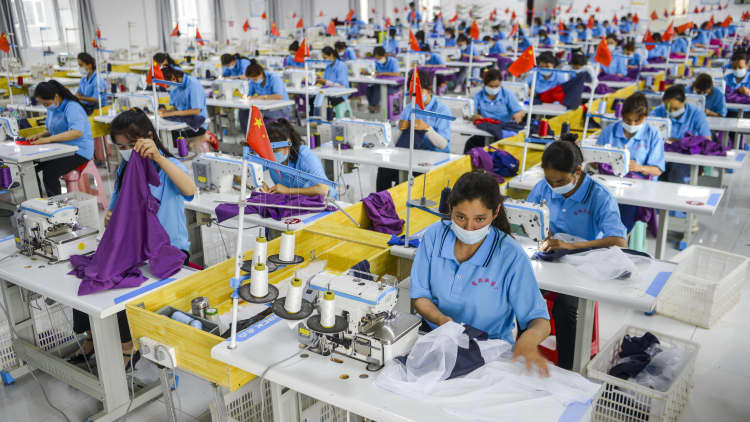Workers make clothes at a garment factory that supplies SHEIN, a cross-border fast fashion e-commerce company in Guangzhou, in China’s southern Guangdong province on July 18, 2022.
Jade Gao | Afp | Getty Images
As fast-fashion giant Shein prepares for an IPO in the U.S., a new report suggests that workers at some of its suppliers are still clocking 75 hour weeks, despite assurances the company would tighten its labor standards.
The report, published Tuesday, details a follow-up investigation by Swiss advocacy group Public Eye after it found in 2021 that staff members across sites in Guangzhou, China, were subject to excessive overtime and poor labor conditions.
Following negative press in the wake of the previous report, Shein promised to improve its standards. However, a new survey by Public Eye, which polled 13 workers across six suppliers in China, has found little progress.
“Illegal working hours and piecework wages remain a typical feature of the everyday lives of the workers interviewed,” the group said. The interviews were conducted late last summer.
In response to CNBC, Shein claimed: “We do not recognise many of the allegations in this report.”
Public Eye said the respondents worked an average of six or seven days a week for 12 hours a day, not including lunch and dinner breaks — a violation of Shein’s supplier code of conduct.
“I work every day from 8 in the morning to 10.30 at night and take one day off each month. I can’t afford any more days off because it costs too much,” Public Eye cited one worker as saying.
Shein’s response
A Shein spokesperson told CNBC that the company was investing tens of millions of dollars in strengthening governance and compliance in its supply chain.
“[T]he discussion on working hours and wages raised by Public Eye is important to us, and we have made significant progress on enhancing conditions across our ecosystem.”
The spokesperson also noted that Public Eye’s report had been based on a small sample size of interviews across six facilities, while Shein’s supply chain relies on thousands of third-party suppliers and contract manufacturers in China.

Shein’s statement also pointed CNBC to results from its second wage investigation which concluded in June last year. According to the company, thousands of third-party audits of its suppliers had found low rates of wage violations and showed workers were earning over two times above their local minimum wage on average and 50% more than the living wage for Shenzhen.
“The report analyses samples from 13,341 samples from across 999 supplier factories across 12 provinces and 43 cities in China,” Shein claimed.
Still, Public Eye argued that its investigation casts doubt over the factory audits commissioned by Shein, noting that they only focused on monthly pay, rather than hours worked by employees. The omission of working hours was part of a blatant “whataboutism,” it added.
According to Public Eye, if workers are putting in 75 hour weeks instead of the standard 40 hours, their basic wage, after deducting overtime pay, is only about 2,400 yuan ($330) per month.
Public Eye cited other potential issues at Shein suppliers, including workers who appeared to be underage and loose enforcement of smoking bans near fabric warehouses. Shein said it had a strict policy against child labor and that such violations would result in the immediate termination of business with a supplier.
The group added that Shein utilizes many offshore entities to disguise ownership and avoid taxes. The company registered its headquarters in Singapore in 2019 and has been based there since 2021.
Cloudy IPO plans
Shein has been on a meteoric rise since bursting onto the fast-fashion retail scene in 2012. Its cheap, trendy clothing offerings and effective social media advertising have made it one of the biggest fashion retailers in the world.
However, Public Eye’s latest report adds to a laundry list of controversies the company has encountered, all of which have harmed its reputation and threaten to obstruct its planned IPO in the U.S., one of its largest markets.

U.S. regulators have previously accused the company of benefiting from forced labor in China’s Xinjiang district, committing human rights abuses, and infringing copyrights.
Meanwhile, Shein has been regularly sued for intellectual property theft, with fashion brands and artists accusing the retailer of systematic plagiarism.
Shein is being probed by the House Select Committee on the Chinese Communist Party for ties to Beijing and its data privacy practices. Lawmakers have also called on the SEC to investigate allegations Shein is using forced labor in its supply chain before it’s allowed to list in the U.S.
According to CNBC’s reporting, Shein has tried to solidify its reputation by applying to join the U.S.-based National Retail Federation, the world’s largest retail trade association. However, it has been repeatedly rejected.
Shein was recently valued at $66 billion, CNBC previously reported, and is expected to be one of the biggest listings of the year if it is able to proceed with its IPO.


